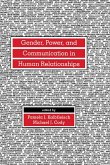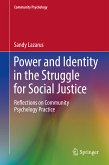The Palgrave Handbook of Power, Gender, and Psychology takes an intersectional feminist approach to the exploration of psychology and gender through a lens of power. The invisibility of power in psychological research and theorizing has been critiqued by scholars from many perspectives both within and outside the discipline. This volume addresses that gap. The handbook centers power in the analysis of gender, but does so specifically in relation to psychological theory, research, and praxis. Gathering the work of sixty authors from different geographies, career stages, psychological sub-disciplines, methodologies, and experiences, the handbook showcases creativity in approach, and diversity of perspective. The result is a work featuring a chorus of different voices, including diverse understandings of feminisms and power. Ultimately, the handbook presents a case for the importance of intersectionality and power for any feminist psychological endeavor.
Eileen L.Zurbriggen is Distinguished Professor of Psychology at the University of California, Santa Cruz, USA where she is also affiliated with the Feminist Studies department. Her most recent book, co-authored with Ella Ben Hagai, is Queer Theory and Psychology: Gender, Sexuality, and Transgender Identities (2022).
Rose Capdevila is Professor of Psychology at the Open University, UK. Her current research is on gender in digital spaces and the history of UK feminist psychology. Rose is a past co-editor of Feminism & Psychology and co-authored A Feminist Companion to Research Methods in Psychology (2022) with Hannah Frith.
Dieser Download kann aus rechtlichen Gründen nur mit Rechnungsadresse in A, B, BG, CY, CZ, D, DK, EW, E, FIN, F, GR, HR, H, IRL, I, LT, L, LR, M, NL, PL, P, R, S, SLO, SK ausgeliefert werden.









